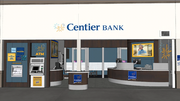Article
'Not the most popular man in the ATM industry': Part II
Part II: An interview with David Wolman, author of 'The End of Money'

April 6, 2012 by Suzanne Cluckey — Owner, Suzanne Cluckey Communications
This is part two in a three-part interview series. In part one, Wolman discusses the mythology of money.
In a chapter titled "Loyalists," David Wolman makes a pretty strong case for cash. He cites one study after another demonstrating that, compared to plastic, cash makes us spend more wisely, behave more honestly and approach life more confidently.
There's a study that shows we'd steal a Coke before we'd steal a dollar; one that confirms we forget a purchase made with plastic more easily than one made with cash; one that proves we are less sensitive to pain and social rejection after handling cash.
And it's not just an American thing. Other cultures experience these same phenomena, as Wolman observed:
[T]here is a sense among the Japanese that not having at least some cash on hand could turn a tricky situation into an emergency. What's more cash gifts are almost a national obsession, required for all kinds of special occasions like weddings and graduations, and on holidays like New Year's. The custom is to give crisp new banknotes, except in the case of a condolence for the family of someone who has died. In that situation, you have to give old banknotes, indicating to the recipients that you know this is not a happy time.
None of this bodes well for the anti-cash crusade. If people throughout the world like this form of money, if it's so intertwined with culture, if it hurts more to part with it, and if it gives us a buzz merely to handle it, who in his right mind would abandon it … ?
How do you send Japanese condolence money in the form of a gift card? Drop it in the mud, cram it into your pocket over and over, run it through the wash, cut illicit drugs with it, do all manner of other unmentionable things people do with paper money. That card still will not have the world-weary appearance of Andy Jackson after a year on a twenty.
So, what is this indelible bond we have with cash? Is it possible to form this same emotional attachment to plastic over time? Ever?
ATM: It's a weird thing — I use plastic for almost every purchase I make but I feel sort of … exposed, if I don't have forty or fifty bucks with me when I leave the house. That cash will sit in my wallet for months, but I need to know it's there.
DW: You're not at all alone in the sense that cash provides a sense of safety to people — and that reassurance. Even though the reality is those notes might stick around in your wallet for ages, you just feel kind of like — not quite naked — but like you don't have your seatbelt on if you go out in the world without some cash on you.
Where the psychology of cash becomes an even more significant piece of the discussion about the fate of cash is this idea that when you have money in physical form you're more careful with your personal finances and your budgeting.
Now, I've talked to a lot of people who say, "No, no, no! When I have cash on me I end up spending it. It's the cash that's too quickly out of my wallet, not the credit card." However, I hear from more people who say the opposite. And those people are more often than not in debt.
And when we're talking about personal or household debt, I especially feel this need to be extremely sensitive to the topic because Americans right now owe $800 billion on their credit cards. It's horrifying. So you have to wonder whether having some of your wealth in physical form is indeed a legitimate way to buttress against debt or the temptation to spend beyond your means.
But whether or not it really is a good strategy to protect against debt, people feel that it is. And actually those people are some of the most vocal that I'm hearing at book readings or media events saying "I had $15,000 in credit card debt and now I cut up my cards and I withdraw funds on the first of the month in cash; I earmark it in envelopes specifically labeled, 'rent,' 'utilities,' 'groceries,' 'gas,' etc. And that's how I budget. If you get rid of my physical money I can't do that."
So I get that, however, the point I try to bring up in the book is that technology can be used to engineer systems to help us make up for our own frailties. We can engineer systems that help us make smarter decisions — whether it's about money, or whether it's about eating, or whether it's about saving for retirement (that's still money, but a different kind of money).
Take an app like Mint. When you log onto a home screen, what you see on the top of the screen in the largest font is your net worth. And if you're a homeowner in America, then more likely than not, your net worth is a negative number. My point is that seeing that negative number often, logging onto your computer or your mobile phone — that's going to impact your financial behavior and your spending habits.
All of which is to say I just don't think the envelope method is the best we can do. We're better than that in terms of technology and sophistication, so we should find ways to recreate the envelope method in digital form because there are all of these other costs to the cash buried in those envelopes.
I think we can come up with the technology to recreate the pain of spending that comes from relinquishing these filthy pieces of paper.
In part three of our discussion of "The End of Money," Wolman explains how technology is making cash obsolete.
About Suzanne Cluckey
Suzanne’s editorial career has spanned three decades and encompassed all B2B and B2C communications formats. Her award-winning work has appeared in trade and consumer media in the United States and internationally.
 ChatGPT
ChatGPT Grok
Grok Perplexity
Perplexity Claude
Claude












